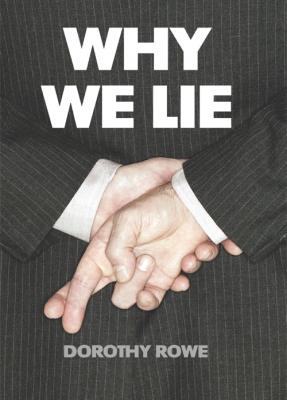Why We Lie: The Source of our Disasters. Dorothy Rowe
Читать онлайн.| Название | Why We Lie: The Source of our Disasters |
|---|---|
| Автор произведения | Dorothy Rowe |
| Жанр | Общая психология |
| Серия | |
| Издательство | Общая психология |
| Год выпуска | 0 |
| isbn | 9780007440108 |
DOROTHY ROWE
Why We Lie
Every aspect of our national character lives in every act of character in our homes and families. If our nation keeps secrets, so too we learn to justify the secrets that we keep. If it isn’t for national security, it’s for personal security. If it’s not civil defense, it’s a defense of ourselves. If our leaders say one thing and do quite another, well, is it any surprise that we use the excuse of their faults to cover up our own?
Harold Lloyd Goodall Jr, A Need to Know: The Clandestine History of a CIA Family
Contents
Chapter One How Can We Know What Is True?
Chapter Two The Curious World We Live In
Chapter Three Do You Know What I Mean?
Chapter Four Why Lying Is Necessary
Chapter Five How We Learn to Lie
Chapter Six The Danger of Being Obedient
Chapter Seven Deciding What Is True
Chapter Eight How Important Is the Truth to You?
Chapter Nine Fantasies Are Important
Chapter Ten The Delights of Shared Fantasies
Chapter Eleven Special Fantasies: Beliefs and Delusions
Chapter Twelve Varieties of Lies
Chapter Thirteen The Same Old Lies
Chapter Fourteen Denying What Is There
Chapter Fifteen Hypocrites All
Chapter Seventeen Lying for Your Government
Chapter Eighteen Never Say You’re Sorry
Chapter Nineteen Some Hard Truths
Lying has been in the news, but then it always has been. While I have been writing this book, we have had the lies of the bankers with their versions of, ‘It’s not my fault’, the lie that is based on the lie that many people tell themselves, ‘Because I am such a superior person I cannot be blamed for anything.’ This lie is based on the very popular but exceedingly stupid lie, ‘I can make reality do what I want it to do.’ As if reality ever bent to some mere mortal’s will! As I write, bankers and politicians are seeking to restore the public’s confidence in them with the delusional lie, ‘We can go back to where we were.’ We can never go back to where we were. Paranoid right-wing Americans are busy trying to spread their lie that Obama was born in Kenya and not in Hawaii as his birth certificate shows. Meanwhile, in Australia, everyone has been transfixed by the unbelievable lies told by a Federal Court judge who was caught for speeding and did not want to pay a $A77 fine (about £39) and get 3 demerit points on his licence. By the time you are reading this you will have learnt of even more amazing lies.
None of us likes being lied to. The only time we do is when we do not want to be told a particular truth that we already know, or at least suspect. We do not like to acknowledge that we lie, and do so frequently. We try to avoid using the words ‘lie’ and ‘lying’ in relation to ourselves. The only lies we willingly admit to are those we call ‘white lies’. We see these as being virtuous. We want to spare another person’s feelings, but the feelings we actually want to spare are our own. We do not want to be upset when another person becomes upset, or have that person reject us for being unkind.
Lies are words or actions that are intended to deceive other people or ourselves. We use a variety of words and phrases to hide the fact that someone is lying. If we want to seem to be very knowledgeable in matters psychological, we say about someone, ‘He’s in denial’, when in fact the person in question may be lying to himself. We can strenuously deny that certain events have happened or are happening. According to some people, the Holocaust never happened, or the climate is not changing. We can claim to hold certain views that in fact we do not hold, and defy anyone to call us hypocrites.
Why do we lie? In certain situations where your own or someone else’s life is in danger, lying can be a sensible thing to do. However, this kind of situation arises very infrequently. Most of us never encounter one. Sometimes we lie almost without thinking, but sometimes we lie in response to feeling that we are in great danger, even though there is no threat to our life. We are frightened, and so we lie.
What we see as being in danger is something we value even more than our life. It is our sense of being a person. We take our sense of being a person for granted, but we refer to it often as ‘I’ or ‘me’ or ‘myself’. It is our sense of being alive, our sense of existence. We might take it for granted but we know when it is under any threat. We move very quickly to protect it.
Each of us has experienced an extreme threat to our sense of being a person, yet we rarely talk about it. We might talk about the event itself, but not what we actually experienced. We might say, ‘I was shattered’, and our audience assume that we were using a cliché, but we were
